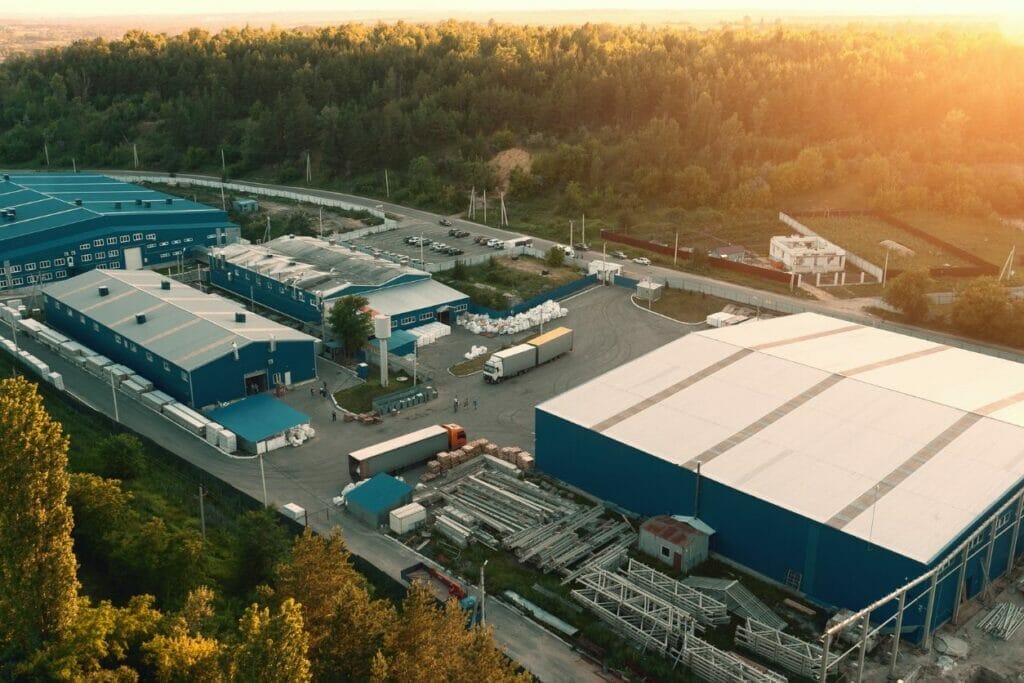
Commercial Real Estate: Definition, Types, & How to Make Money
Real estate refers to property ownership and can be divided into two main types: commercial real estate and residential real estate. While residential properties are meant for living and housing, commercial real estate is focused on business activities. These commercial properties play a vital role in commerce, providing spaces for businesses and economic activities.
Commercial real estate property stands as a beacon of profit in the investment landscape. A CBRE report from 2023 shows more than $1 trillion was invested in commercial real estate transactions by the end of Q4 in 2022. Although down from 2021, this is still a monumentally significant number! Understanding this market’s intricate dynamics isn’t just prudent; it’s the cornerstone of wise decision-making.
This article aims to help you appraise the different types of commercial real estate and break down how to maximize those profit margins!

Table of Contents
What Is Commercial Real Estate?
Commercial real estate is a property used for business purposes rather than residential living. These properties, like offices, retail spaces, and industrial complexes, serve as commerce and income generation platforms. Investing in commercial real estate offers an avenue to grow wealth by leasing or selling these properties to businesses. Understanding the market trends, location significance, and rental demand is crucial for making informed investment decisions and maximizing returns on the available funds.
What are the types of commercial real estate?
The landscape of commercial real estate is as diverse as the businesses it accommodates. There are several types of commercial real estate that are usually categorized by their function:

Office space
Office properties are a subset of commercial real estate and houses workspaces primarily for corporate and professional use, distinct from retail or manufacturing.
They’re classified into three categories based on quality, location, and amenities, reflecting the varying demands of businesses seeking suitable environments to conduct their operations:
Class A
Class A office buildings within commercial real estate epitomize excellence. Found in sought-after locations, they boast contemporary architecture, recent construction or comprehensive renovations, superior infrastructure, and an array of amenities. These top-tier spaces offer luxury, prime positioning, and state-of-the-art facilities, appealing to businesses prioritizing modernity and excellence.
Class B
Class B office buildings strike a balance between quality and affordability, positioning themselves between Class A and Class C counterparts. While less luxurious than Class A, they offer well-maintained structures in areas of moderate demand, providing a cost-effective yet respectable option for businesses.
Class C
Class C office buildings present budget-friendly options with limited finishes, lower business demand, and profitability compared to Class A and B. Often found on city outskirts or in suburban districts; they offer minimal amenities. They may necessitate extensive interior and exterior renovations to attract tenants.

Industrial use
Industrial use properties vary, from heavy manufacturing to light assembly and storage warehouses. They play a pivotal role in the business landscape. Industrial real estate is subjected to stringent regulations, facing complex zoning rules tailored to specific industries. For instance, oil refineries can only be established in some industrial zones. Feasibility hinges on the city, state regulations, and location. The potential of commercial properties for industrial use demands a thorough understanding of regional guidelines and industry compatibility.

Retail
Retail properties serve as spaces for businesses centered around sales and merchandise. Many enterprises operate out of these buildings, from hair salons and local shops to restaurants and grocery stores. Leased spaces are common among retail businesses, as they provide an avenue for showcasing products and services, catering to diverse consumer needs in bustling marketplaces.

Multifamily rental
Multifamily rental units, including apartment buildings, rowhouses, and assisted living facilities, straddle the line between commercial and residential real estate. While people inhabit these spaces, they function as businesses, generating revenue for their owners. Typically, structures comprising of five or more units are considered commercial, distinct from one to four-unit buildings categorized as residential but often treated as investment properties. Local zoning laws further differentiate areas for single-family or multifamily dwellings, reflecting the unique nature of these multifaceted real estate assets.

Hotel
Hotels, a crucial facet of commercial real estate, can be categorized into three distinct types:
- Full-service hotels are establishments, often gracing central business districts or tourist hotspots, synonymous with luxury. Icons like Four Seasons, Marriott, and Ritz Carlton belong to this category. They pamper guests with an array of amenities, from room service to lavish dining options, conference spaces, and spa facilities. The allure of these hotels lies in their grandeur and top-notch service, contributing to their prominent role in the hospitality landscape.
- Limited-Service Hotels are a niche subset that leans toward boutique aesthetics. Smaller in scale, they curate a more intimate experience. These properties may lack some amenities found in full-service counterparts, such as room service and sprawling convention spaces. However, their charm emanates from personalized attention, often appealing to travelers seeking a unique stay that balances comfort with character.
- Extended Stay Hotels cater to specific needs like extended stays, typically a week or more. With larger rooms and equipped kitchens, they mirror a home-away-from-home ambiance. These hotels prioritize practicality, aiming to fulfill the requirements of extended travelers, be it for business or leisure. The focus on functionality and a comfortable living environment make them a distinctive player in the hospitality and commercial real estate sectors.
Special Purpose
Special purpose properties in commercial real estate stand apart from the major types previously explored. These properties serve specific functions and often possess distinctive features. Amusement parks, bowling alleys, parking lots, stadiums, theaters, zoos, and more fall under this classification. Unlike the broader categories, special purpose properties cater to niche demands, emphasizing specialized offerings ranging from entertainment venues to recreational destinations, showcasing the diverse landscape within commercial real estate.

How do Investors Make Money in Commercial Real Estate?
Investing in commercial real estate offers the potential for substantial profits, serving as a hedge against stock market volatility. Investors can capitalize on property appreciation upon sale, reaping gains from value growth over time. However, the primary source of revenue stems from tenant rents, with regular income generated through lease agreements.
As businesses utilize commercial spaces, steady rental payments provide a consistent cash flow, enhancing the investment’s financial stability. The dual advantages of capital appreciation and rental income establish commercial real estate as a promising avenue for building wealth and diversifying investment portfolios.
Direct Investment
Direct investment in commercial real estate involves becoming a landlord through property ownership, a strategy demanding substantial industry insight or assistance from knowledgeable firms. Suited for high-net-worth individuals, this approach offers high-risk, high-reward potential. Optimal properties are situated in low-supply and high-demand areas, leading to favorable rental rates.
Additionally, the local economy’s strength influences property value. By mastering location dynamics, capitalizing on demand, and understanding economic trends, investors can generate income through rent and profit from property appreciation while navigating the intricacies of commercial real estate investment.
Indirect Investment
Indirect investment is when an individual or group invests in owning market securities like real estate investment trusts (REITs) or exchange-traded funds (ETFs) linked to commercial property-related stocks.
Alternatively, investors such as banks and Realtors can back companies servicing the commercial real estate sector. This approach offers diversification without direct property ownership responsibilities.
Benefits include liquidity, reduced risk exposure, and the opportunity to profit from market trends without specialized industry knowledge. It provides a simplified path to tap into the commercial real estate market while leveraging established market instruments and related industries.

What are the Benefits of Investing in Commercial Real Estate?
Investing in commercial real estate offers a range of compelling benefits. With surging demand, it’s an opportune sector for investors and job seekers. Attractive leasing rates can yield impressive returns, generating substantial monthly cash flows. While industrial buildings rent at lower rates, their lower overhead costs provide a balance.
This investment approach can be a sustainable, long-term wealth strategy while contributing to community well-being. Asset appreciation, tax advantages, and the potential for passive income are enticing prospects. Longer lease contracts assure cash flow stability. Diversification potential and income security amid market volatility further underscore the allure of commercial real estate.
Disadvantages of Commercial Real Estate
While investing in commercial real estate holds appeal, it has its share of drawbacks. The foremost concern is financial; properties’ initial purchase, management, and upkeep entail substantial costs. Compared to residential properties, the upfront investment is significantly higher.
Other concerns are that managing properties demands time, especially without third-party outsourcing. Complex regulations across states, counties, industries, and zoning can deter direct investments. Tenant turnover’s varying needs and expensive refurbishments between occupants pose risks. Economic uncertainties can lead to sudden retail closures, elevating vacancy risk.
Additionally, inflation’s impact on costs and vacancy rates can strain investments. Credit risks, as well as the sluggishness of commercial property transactions, warrant prudent consideration.
Overall, many factors must be considered before deciding whether to invest in commercial real estate.

How do I Buy Commercial Real Estate?
To buy commercial real estate, begin by educating yourself in a specific investment type. Choose between multifamily, office, retail, industrial, or hospitality properties that align with your interests. Define your strategy according to your objectives.
Assembling a specialized team of professionals for support can prove invaluable. Submit at least one offer per week to participate in the market actively. This approach entails informed decision-making and strategic execution, ensuring your journey into commercial real estate is well-guided and maximizes potential gains.

How do I sell Commercial Real Estate?
To sell commercial real estate, follow a systematic approach. Begin with thorough preparation, including understanding your needs, obtaining a property appraisal, and ensuring optimal property condition. Set a reasonable price through appraisal, market research, and local trends.
Effective marketing employs listing services, networking, and possibly a broker. Negotiations based on research and appraisal require flexibility. Be ready for the closing phase, gathering paperwork, understanding financing, and considering tax implications like a 1031 exchange.
This comprehensive process ensures a seamless and fruitful transaction in the competitive commercial real estate arena.

What Does a Commercial Real Estate Broker Do?
A commercial real estate broker assists clients in purchasing, leasing, selling, or renting nonresidential properties, like office or retail spaces. They bring expertise in market trends, property valuation, negotiation, and legal aspects. What a commercial real estate broker does, is help their clients navigate the complex commercial real estate landscape and make informed decisions that align with their goals.
About The Author

Jesse Shemesh
Disclaimer
Please note that Point Acquisitions is not a tax expert or tax advisor. The information on our blogs and pages is for general informational purposes only and should not be relied upon as legal, tax, or accounting advice. Any information provided does not constitute professional advice or create an attorney-client or any other professional relationship. We recommend that you consult with your tax advisor or seek professional advice before making any decisions based on the information provided on our blogs and pages. Point Acquisitions is not responsible for any actions taken based on the information provided on our blogs and pages.
1031 Exchange Capital Gains Tax Deferral
According to a 2021 report by the National Real Estate Exchange Services (RES), over 240,000 1031 exchange transactions were completed in the United States, totaling $100 billion. This impressive figure underscores the role of 1031 exchanges in the real estate…
Read More1031 Exchange Benefits
As of Q4 2023, the national vacancy rate for all commercial property types in the United States sat at 9.2%, according to CBRE’s latest insights and research. This represents a slight decrease compared to the previous quarter and suggests a…
Read More1031 Exchange Legal Considerations: A Must-Read Guide
You’re in the right place if you’re considering a 1031 exchange for your commercial real estate investments. Whether you’re a seasoned investor or just dipping your toes into the market, understanding the legal landscape of 1031 exchanges is key to…
Read More

